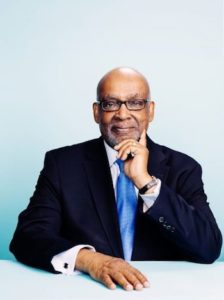
Norman B. Rice
*Norman Rice was born on this date in 1943. He is a Black politician, administrator, and community activist.
From Denver, Colorado, Norman Blann Rice is the youngest son of Irene Hazel Johnson and Otha Patrick Rice. His father worked as a Pullman Porter on the railroads and for the United States Postal Service. He also owned and operated Rice’s Tap Room and Oven in Denver. Rice’s mother was a caterer and a bank clerk. Rice’s parents divorced when he was a teenager. His grandmother, Reverend Susie Whitman, Assistant Pastor at Seattle’s First A.M.E. Church, was one of the first Western women ministers in the African Methodist Episcopal Church.
In 1961, after graduating from Denver Manual High School, Rice attended the University of Colorado at Boulder. He left in his second year and went to work as a hospital orderly, a meter reader, and an engineer’s assistant. In 1969, Rice arrived in Seattle and restarted his education at Highline Community College, receiving his A.A. degree in 1970. He entered the University of Washington through the Economic Opportunity Program (EOP). By 1972, Rice had earned his B.A. degree in communications, and in 1974, his M.A. degree in public administration at the University of Washington. Rice married Constance Williams on February 15, 1973. They have one adult son, Mian Rice, and one grandchild, Sekoy Elliott Rice.
Rice worked as a reporter at KOMO-TV News and KIXI radio. He served as Assistant Director of the Seattle Urban League. He next worked as Executive Assistant and Director of Government Services for the Puget Sound Council of Governments. In 1978, Rice was elected to the Seattle City Council to fill a vacancy. He was reelected in 1979, 1983, and 1987. He was chair of the Energy, Finance, and Budget Committees and was Council President for one term. Rice facilitated the development of more equitable cost allocation and rate design procedures for Seattle City Light as part of his work on the Energy Committee. His Finance and Budget Committee accomplishments included the passage of the Women and Minority Business Enterprise Ordinance and eliminating City investments in firms doing business in South Africa.
In 1985, he ran for mayor but lost to Charles Royer. Rice ran again 1989 in a crowded field and won 99,699 to 75,446. Rice was Seattle's first Black mayor. He was re-elected in 1993. During the technology boom of the 1990s, Rice led the rejuvenation of Seattle's downtown. He also served as President of the U.S. Conference of Mayors. In 1995, Rice served as a committee member for the Rudy Bruner Award for Urban Excellence. In 1996, Rice ran in the Democratic primary for Governor of Washington but was defeated.
In 1997, Rice appeared as himself on an episode of Frasier entitled "The 1000th Show." From 1998 to 2004, he was CEO and president of the Federal Home Loan Bank of Seattle. Rice served a three-year term as a Distinguished Practitioner-in-Residence at the University of Washington’s Daniel J. Evans School of Public Affairs and leads the Civic Engagement project in the 21st Century.
In 2009, he was named CEO of the non-profit Seattle Foundation. In 2010, he was nominated as one of 30 members for a two-year appointment in the White House Council for Community Solutions, created by the Executive Order of President Barack Obama. Cornish College of the Arts, Seattle University, the University of Puget Sound, and Whitman College have awarded him honorary degrees. As of 2016, Norman Rice has begun writing his autobiography.
African American Registry
Voices That Guide Us, interview
Box 19441, MPLS., MN 55419